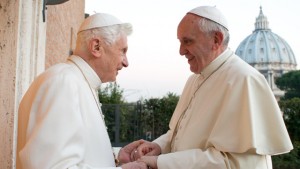Strange times drive us along strange paths. In the midst of the latest controversies and hoopla – the pope, we’re told, just called us to “worship” poor people (actually, “kneel in veneration” in the, probably metaphorical, Italian), the German bishops are up to no good, Raul Castro was so impressed after meeting with Pope Francis yesterday that he may return to the Church – I found myself looking through the 2000 “Declaration” by the Congregation for the Doctrine of the Faith, Dominus Jesus, which is interpreted, “On the Unicity and Universality of Jesus Christ and the Church.”
To transpose that mouthful a few octaves lower, this document from the bad (to some) old (to others) days when Joseph Ratzinger was the Vatican official in charge of doctrine, at the very beginning of the third Christian millennium, tried to reassert what for most of the previous 2000 years was so taken for granted that it almost needed no special assertion: that Jesus is the only Savior of the human race and the Catholic Church is his authoritative presence in the world.
There have long been minor codicils to this rule, e.g., acknowledgment of “virtuous pagans” and “baptism of desire” among those who did the best they knew. Rays of the light of Christ are everywhere in Creation, including other religions. But the basic rule was clear – as indeed, it must be if the Church really regards itself as something more than just one among many world religions and philosophies. And intends to take literally Jesus’ own words about preaching the Gospel to all nations so that all who believe can be saved. (Mk. 16:15-16)
Of course, many in the developed world no longer believe they need saving, let alone need the Church to save them. But Dominus Jesus patiently goes through the reasons why such an attitude is not only wrong but self-defeating, starting with the mistaken belief that the fact of religious pluralism in the world is a kind of proof that no belief is better than any other.
This sounds nice and democratic and polite to people who don’t much care one way or another, but try telling a real Muslim or Jew, Hindu or Sikh – instead of some dessicated Christian – that his or her religion is no better than another; you’ll quickly experience many pointed problems with this liberal approach.
Indeed, in such a strange perspective, the CDF points out, any faith that claims to possess the truth thereby shows itself to be naively sectarian. Meanwhile, what we know from wide experience to be not a bland peace but the disorderly welter and violent clash of faiths and morals globally is, somehow yet to be demonstrated, more universal.
Or, as we often hear it mistakenly asserted: “All religions seek the same thing,” a kind of religious imperialism that reduces all real religions to subsets of modern international liberalism.
Dominus Jesus warns that even Catholics often fall prey to this incoherent nonsense: “Not infrequently it is proposed that theology should avoid the use of terms like ‘unicity,’ ‘universality,’ and ‘absoluteness,’ which give the impression of excessive emphasis on the significance and value of the salvific event of Jesus Christ in relation to other religions. In reality, however, such language is simply being faithful to revelation, since it represents a development of the sources of the faith themselves.”
Indeed, as has been clear historically, this unique Catholic thing has had an amazing career: “The Christian mystery, in fact, overcomes all barriers of time and space, and accomplishes the unity of the human family.”
Although all this may seem to belong to that pre-Francis period of theological combativeness, which has allegedly now been superseded by the age of love and mercy, in fact, Francis has himself repeated such strong themes over and over, because they cannot be superseded.
What he’s brought to this struggle is not a change in the substance but – in a way, precisely because his two predecessors already carried out the work of theological reaffirmation – a different emphasis on how these truths are to be affirmed.
St. Paul already identified the situation when he first wrote to the Corinthians about a more excellent way: “If I speak with the tongues of men, and of angels, and have not charity, I am become as sounding brass, or a tinkling cymbal.”
This, I take it, is the basis for what Francis meant in Evangelii Gaudium, “When preaching is faithful to the Gospel, the centrality of certain truths is evident and it becomes clear that Christian morality is not a form of stoicism, or self-denial, or merely a practical philosophy or a catalogue of sins and faults. Before all else, the Gospel invites us to respond to the God of love who saves us, to see God in others and to go forth from ourselves to seek the good of others. . . .All of the virtues are at the service of this response of love. If this invitation does not radiate forcefully and attractively, the edifice of the Church’s moral teaching risks becoming a house of cards, and this is our greatest risk. It would mean that it is not the Gospel which is being preached, but certain doctrinal or moral points based on specific ideological options.”
This much misunderstood warning about the moral house of cards – absent the Gospel that undergirds morality – is particularly urgent in the developed world, where Christianity is treated as, at most, one more ideology, a set of assertions like any number of other possible systems of thought.
But while faith has given birth to some quite breathtaking flights of reason, and these desperately need to be recovered to keep the human race from destroying itself, Christianity cannot enter the fray as merely a collection of ideas. Faith has to come at things on another plane. And it will only do so if our charity is so conspicuous that it demonstrates that still more excellent way.
















